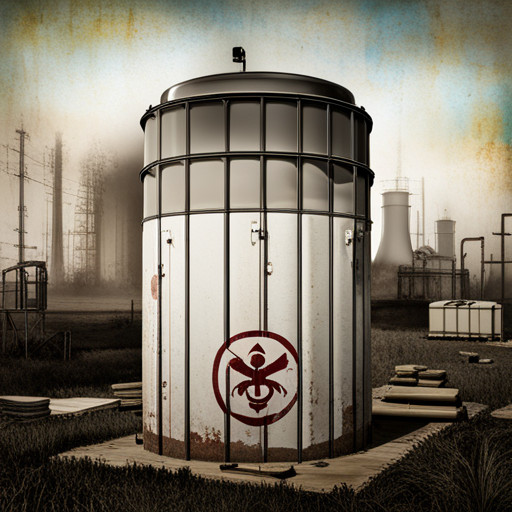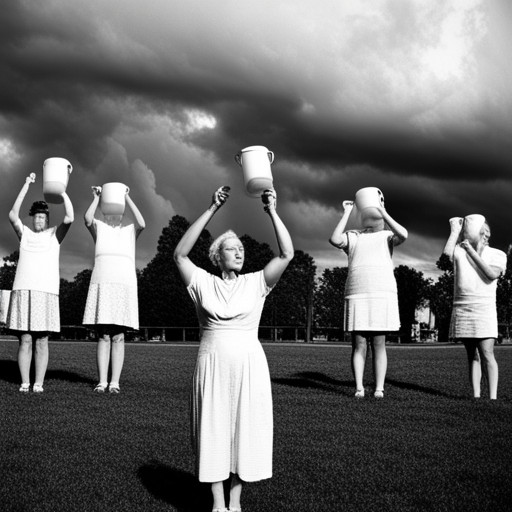Camp Lejeune Water Contamination Hidden Dangers Revealed
Unearthed is the haunting tale of Camp Lejeune, a military base shrouded in the shadow of a water contamination scandal. The saga stretches from 1953 to 1987, during which volatile organic compounds infiltrated the drinking water, spawning a myriad of health complications.

This exposé delves into the negligence of military leaders, the consequent legal battles, and the poignant stories of the affected, illuminating the human cost of an environmental catastrophe.
Key Takeaways
- Military leaders failed to adequately warn those living or working on the base of the dangers lurking in their tap water.
- Pregnant women living or working on the base from 1953 to 1987 and drinking the contaminated tap water have given birth to stillborn children.
- Children born to parents serving at Camp Lejeune from 1953 to 1987 have developed childhood leukemia, a fatal form of cancer.
- The CDC study concluded that hundreds of children have died from cancer as a result of drinking the contaminated tap water.
Unveiling the Negligence: Failure to Warn About Water Contamination

The negligence of military leaders at Camp Lejeune in failing to adequately warn about water contamination has been revealed, resulting in tragic outcomes such as stillbirths, childhood leukemia, and kidney cancer among those exposed between 1953 and 1987. This failure has had a profound impact on military families, with severe public health concerns arising as a result.
Exposure to volatile organic compounds (VOCs) in the drinking water, including trichloroethylene, tetrachloroethylene, benzene, 1,2-dichloroethylene, and vinyl chloride, has been linked to these health issues. A study by the CDC focused on children born to parents at Camp Lejeune during this period, highlighting the magnitude of the issue.
The lack of adequate warning has resulted in numerous lawsuits, further emphasizing the gravity of the situation.
The Shocking Findings: CDC Study on Camp Lejeune Water Contamination

Shocking findings from the CDC study revealed a significant correlation between the consumption of hazardous tap water and the onset of fatal health conditions among military families based in a prominent US camp from 1953 to 1987. The contamination, primarily from volatile organic compounds (VOCs), had long term health effects, including childhood leukemia and other cancers. The environmental impact of the contamination was catastrophic, affecting thousands of individuals.
| Contamination Source | Health Implications |
|---|---|
| Trichloroethylene (TCE) | Neurological Effects |
| Tetrachloroethylene (PCE) | Kidney and Liver Damage |
| Benzene | Leukemia and Non-Hodgkin Lymphoma |
| 1,2-Dichloroethylene (DCE) | Liver, Lung, and Kidney Damage |
| Vinyl Chloride | Liver, Lung, and Blood Cancers |
It's clear that this tragic situation underscores the dire consequences of environmental negligence.
Legal Action: Recent Camp Lejeune Water Lawsuit News

Legal proceedings have surfaced recently, highlighting the severe impacts of hazardous substance exposure on military families, with particular emphasis on incidents of water pollution. The Camp Lejeune water lawsuit updates underscore the gravity of the situation, as survivors recount harrowing experiences of illnesses and losses attributed to water contamination.
Bellwether trials are anticipated to establish compensation levels for plaintiffs, bringing a degree of resolution to the affected families. It has been posited that offspring born at Camp Lejeune may be predisposed to developing cancer in their lifetime due to the extent of exposure.
The lawsuits are not only a quest for justice but are also aimed at acknowledging the need for comprehensive measures to prevent similar incidents in the future.
Seeking Remediation: Camp Lejeune Justice Act Claim Information

In pursuit of remediation for the harm endured, victims are turning to the Justice Act claims, which are strictly limited to federal law tort claims exclusively created under the Act. This compensation process is a manifestation of government accountability, albeit marred by delays and complications.
Delays in addressing these claims compound the challenges faced by marine veterans.
Seven attorneys are designated to expedite these lawsuits, aiming to streamline the process.
Despite this, marines are cautioned not to anticipate a swift resolution, highlighting the prolonged nature of the process.
This situation underscores the importance of addressing the legacy of environmental hazards and the critical role of the Justice Act in holding the government accountable.
The Fight for Justice: Camp Lejeune Widows Seek Justice

An alarming number of bereaved families are grappling with the devastating impacts of water contamination, many left destitute and in need of support for veterans. The protracted delays in the Camp Lejeune Justice Act proceedings are further compounding their hardships.
A committee of seven attorneys has recently been appointed to expedite the litigation process. However, a stern warning has been issued to affected marines, cautioning against expectations of quick compensation payout.
The Human Cost: Personal Stories of Affected Individuals

Transitioning from the legal battles waged by the bereaved families of Camp Lejeune, the focus now shifts to the personal testimonies of those directly affected by the water contamination. These narratives provide a compelling and heart-wrenching insight into the long-term health effects suffered by individuals.
Numerous accounts detail a lifetime of health struggles, from birth defects and childhood cancers to long-term neurological conditions.
Heartrending stories of stillbirths and neonatal deaths are prevalent, highlighting the devastating impact on the most vulnerable.
Personal testimonies often recount the psychological trauma of witnessing loved ones suffer, adding a layer of emotional distress to the physical ailments.
Many narratives express a sense of betrayal by the military institution they served, underlining the human cost of bureaucratic negligence.
Unraveling the Truth: Scientific Studies on the Contamination

Scientific investigations into the adverse health effects of prolonged exposure to contaminated drinking water have been pivotal in establishing the link between the water source and the reported health conditions.
In-depth studies conducted by the Centers for Disease Control and Prevention (CDC) on the Camp Lejeune water contamination case provided evidence of the potential health risks associated with volatile organic compounds (VOCs). The research extensively analyzed over 12,000 cases of children born to parents serving at Camp Lejeune from 1953 to 1987.
Findings confirmed instances of neural tube defects, oral clefts, and childhood hematopoietic cancers, thereby corroborating the long-term effects of the water contamination.
These studies serve as a testament to the dire consequences of contaminated drinking water on human health.
Legal Implications: Understanding the Camp Lejeune Justice Act

The enactment of the Justice Act has significant legal implications for those affected by the environmental disaster. It provides a pathway to claim compensation for the serious injuries and fatalities caused by exposure to hazardous substances. The Act specifies criteria for compensation eligibility, laying out a detailed legal process.
- Victims must provide evidence of exposure to contaminated water at Camp Lejeune.
- A direct link between the exposure and subsequent illness or death must be established.
- Legal claims must be filed within a specified timeframe.
- Compensation is contingent on successful navigation of the complex legal process.
This legislation, while offering hope, also presents substantial challenges. Navigating the legal process may prove daunting for victims already grappling with the devastating health consequences of the disaster.
Steps Forward: Efforts to Address the Issue and Prevent Future Contaminations

Efforts to address the issue and prevent future contaminations have been put in place, focusing on stringent water testing protocols, enhanced environmental regulations, and increased transparency.
These preventive measures aim to safeguard public health by eliminating potential sources of contamination and ensuring access to safe, clean water. Rigorous water testing protocols are now being implemented to detect contaminants at early stages, allowing for prompt remediation.
Environmental regulations have also been strengthened to control and manage hazardous waste, thereby reducing the risk of water contamination.
Moreover, transparency in reporting contamination incidents has been prioritized to ensure timely public notifications.
These efforts embody a proactive approach towards water contamination prevention, underscoring the importance of vigilance, regulatory compliance, and effective communication in safeguarding public health.
Frequently Asked Questions
What Are the Long-Term Health Effects for Those Who Were Exposed to the Contaminated Water at Camp Lejeune?”
Long-term health effects of exposure to contaminated water at Camp Lejeune include serious conditions such as leukemia, kidney cancer, and birth defects. Legal recourse for victims includes claims under the Camp Lejeune Justice Act.
How Has the Contamination at Camp Lejeune Impacted the Surrounding Environment and Wildlife?”
The contamination spread from Camp Lejeune has significantly impacted the surrounding environment and wildlife. Alterations in local ecosystems have necessitated wildlife adaptation, with numerous species exhibiting changes in behavior, development, and reproductive patterns.
What Preventative Measures Were Implemented at Camp Lejeune After the Discovery of Water Contamination to Ensure It Doesn’t Happen Again?”
Post-discovery of water contamination at Camp Lejeune, preventive measures implemented included stringent contamination detection systems and advanced water filtration protocols to ensure recurrence prevention, safeguarding the base's water supply.
Are There Any Other Military Bases That Have Experienced Similar Issues With Water Contamination?”
Numerous military bases globally have encountered water contamination issues similar to Camp Lejeune. Contamination sources range from industrial waste to agricultural runoff, often leading to serious legal implications and health concerns.
What Resources Are Available for Those Seeking Mental Health Support After Experiencing Health Issues or Loss Due to the Camp Lejeune Water Contamination?”
Various resources are available, including counseling services and compensation claims procedures, to provide mental health support for individuals impacted by health issues or loss due to water contamination incidents.

This post has been generated by AI and was not reviewed by editors. This is Not legal advice. Please consult with an attorney.




